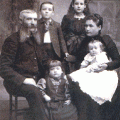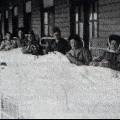 I am often dismayed by all the ‘negative news’ in the press, perpetuating what I see as a culture of fear; headlines about all the dangers out there, real and invented. I fully understand that these kinds of headlines are what lure readers in a highly competitive market. Still, shouldn’t the press be informing us about genuine threats so we can do something about them?
I am often dismayed by all the ‘negative news’ in the press, perpetuating what I see as a culture of fear; headlines about all the dangers out there, real and invented. I fully understand that these kinds of headlines are what lure readers in a highly competitive market. Still, shouldn’t the press be informing us about genuine threats so we can do something about them?
Do we need that front page headline about an asteroid about to hit Earth in 2010 (with a disclaimer buried on page 85 the next day? Isn’t the fifth estate’s job in a democracy to empower people with information, not to scare them into some frozen state of purple-faced fear?
Asteroids, terrorists, mercury in fish, melting glaciers, video games, kidnappers, and, now, bird flu. Meanwhile many mothers I know have refused to immunize their children against the usual childhood diseases after reading about rare cases of adverse reactions.
How to tell a real menace from a false alarm? I have a stash of letters from the 1910 that provide me with perspective. They were written by my husband’s ancestors, the Nicholsons, of Richmond, Quebec. (www.tighsolas.ca)
Back then, in the era of the New Publishing, threats to life and limb abounded. There was “the White Peril” (contaminated milk), the menace of the slum, and the menace of the motion picture show, to cite but a few.
Milk contamination and poverty were a genuine menace, infant mortality was sky high in the slums of Montreal, but lovely Lillian Gish? Clearly Not. And as for disease, well, sudden death and dying were part and parcel of every day life.
The letters I have on hand from “the Lewis diaspora” are filled with descriptive accounts of pneumonia, diphtheria, and consumption. Friends and acquaintances of the family were dropping like flies, the old people, the sickly, the young and robust. There were so many deaths in the Richmond area in 1912, people couldn’t help remark on it.
According to one article I have on hand in a 1910 Technical World Magazine, pneumonia and tuberculosis (or consumption) were the big killers, with heart disease coming in third. That’s the reason why my husband’s relatives (hardy Isle of Lewis stock) seem to obsess over every cough and sniffle in the family. A cold could turn into “la grippe” and kill a person in short order.
 So, when I read all the stories about the bird flu in the press (especially one about how a scientist has recreated the 1918 bug) I can put things in context. Some letters of the era discuss the Spanish Flu, like this October 1918 missive from Agnes Rothney, in Lennoxville:
So, when I read all the stories about the bird flu in the press (especially one about how a scientist has recreated the 1918 bug) I can put things in context. Some letters of the era discuss the Spanish Flu, like this October 1918 missive from Agnes Rothney, in Lennoxville:
Nothing going on here but people dying and the church bell ringing for funerals and hearses going up and down in processions
Many more letters discuss the horrors of War.
Epsom, October 27, 1918
Dear Flora,
I received your letter last night and was glad to hear from you. I feel pretty blue over Percy as he refused to go back to Canada when he was here last. It doesn’t pay to be a hero here. He must have been killed outright as he wasn’t admitted to any hospital.
The 1918 flu epidemic took place at the end of the First World War. I gather this was a factor in its spreading.
Letters from other years reveal more about the health issues of the era. In 1912, Margaret Nicholson, my husband’s great grandmother, tended a niece with typhoid and a brother with consumption. “He has a cough that sounds so hollow,” she wrote. And at Macdonald College in 1911-12, where Flora was studying to be a teacher, two girls succumbed to disease.
Epidemics weren’t rare. In 1902, a relative in Minerville, New York (Reverend Norman Nicholson) talked about half of the population having the flu.
The same relative discussed diseases in the Eastern Townships in an earlier 1894 letter, “I heard from someone in the Gore that your family got over the difftheria [sic] and now the scarlet fever is about you. Don’t worry. It may be all around and not enter you home. It may enter you home and all come through it. All you can do is do the best for your family and leave the rest to our Heavenly Father whose care is over all of us.”
In 1910, another relative wrote in Chicago this harrowing account of Scarlet fever in her family:
 My youngest brother James was East this spring telling us so much of his dear children – on his way home he had telegrams telling of the serious illness of the two youngest with Scarlet Fever and before he reached home his precious little girlie died. Millicent, aged a little over 8 years. Little Ladner about 7 is still critically ill. They have lanced his glands and his arm and side, the puss came by the cupfuls. I really have very little hopes of his recovery. It is a dreadful affliction.
My youngest brother James was East this spring telling us so much of his dear children – on his way home he had telegrams telling of the serious illness of the two youngest with Scarlet Fever and before he reached home his precious little girlie died. Millicent, aged a little over 8 years. Little Ladner about 7 is still critically ill. They have lanced his glands and his arm and side, the puss came by the cupfuls. I really have very little hopes of his recovery. It is a dreadful affliction.
Cancer is talked about a few times in the many letters from the 1900 period, and there’s even mention of a ‘lady doctor’. One enigmatic letter describes the tough time a friend is having with a sick son, who runs around on all fours frothing at the mouth. Rabies?
You see, in those days, for every sick person suffering from a killer ailment there was at least one more person at his or (more usually) her wit’s end from having to care for the sick person. Few people could afford nurses. Life was very, very hard.
So what have I gleaned from these letters? I believe we modern Westerners are so insulated from death and disease, in general we greatly fear what people in the past took for granted; and because we are inundated with negative news from every corner we feel helpless and do little to prevent the lifestyle diseases or environmental degradation that are the real threat to our and humanity’s long term health.
That’s what I think, anyway, as a media critic who just happens to have a big bunch of letters belonging to one turn of last century Eastern Townships family.
Oh. PS…An asteroid did fall to earth in June 1908, scorching miles of Siberian wilderness and knocking people miles away out of their beds. The Nicholsons and other citizens of the Eastern Townships went about their business that day; the better for having never been warned about it.